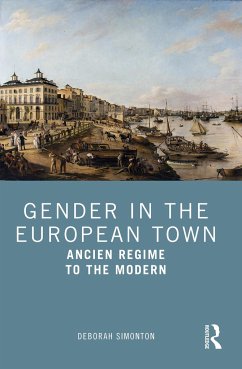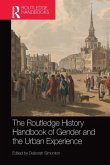Moving from the mid-seventeenth century to the near present, this book marks physical and conceptual changes across European towns and examines how gender was implicated and imbricated in those changes.
As places which fostered and disseminated key social, economic, political and cultural developments, towns were central to the creation of gendered identities and the transmission of ideas across local, national and transnational boundaries. From 1650 to 2000, towns grew rapidly and responded to the needs for new infrastructures, physical reconfiguration and ideas of citizenship. Gender relations vary over space and time and are continually altering; such variation underlines the need for a thorough non- or even anti-essentialism. Drawing primarily on three themes of economy, civic identity and uses of space, the volume shows that urban development, and responses to it, is not gender neutral and thus argues for the fundamental importance of a gendered perspective.
Gender in the European Town is a useful resource for all students and scholars interested in urban history and its interaction with gender from 1650 to the present.
As places which fostered and disseminated key social, economic, political and cultural developments, towns were central to the creation of gendered identities and the transmission of ideas across local, national and transnational boundaries. From 1650 to 2000, towns grew rapidly and responded to the needs for new infrastructures, physical reconfiguration and ideas of citizenship. Gender relations vary over space and time and are continually altering; such variation underlines the need for a thorough non- or even anti-essentialism. Drawing primarily on three themes of economy, civic identity and uses of space, the volume shows that urban development, and responses to it, is not gender neutral and thus argues for the fundamental importance of a gendered perspective.
Gender in the European Town is a useful resource for all students and scholars interested in urban history and its interaction with gender from 1650 to the present.
'Exploring gender in the European town, Deborah Simonton provides essential reading for everyone interested in the many dimensions of urban life.'
Dag Lindstrom, Uppsala University, Sweden
'Gender in the European Town offers a cutting-edge and nuanced survey of how gender informs the urban experience, during a critical period of expansion and evolution. Highlighting the complex interplays of identity, politics, space, belonging, economy and society in small towns and large cities across the breadth of Europe, this volume will be a core text for students and scholars that wish to understand the important role of towns in shaping everyday life and processes of historical change. A remarkable achievement by a leader in the field.'
Katie Barclay, University of Adelaide, Australia
Dag Lindstrom, Uppsala University, Sweden
'Gender in the European Town offers a cutting-edge and nuanced survey of how gender informs the urban experience, during a critical period of expansion and evolution. Highlighting the complex interplays of identity, politics, space, belonging, economy and society in small towns and large cities across the breadth of Europe, this volume will be a core text for students and scholars that wish to understand the important role of towns in shaping everyday life and processes of historical change. A remarkable achievement by a leader in the field.'
Katie Barclay, University of Adelaide, Australia








